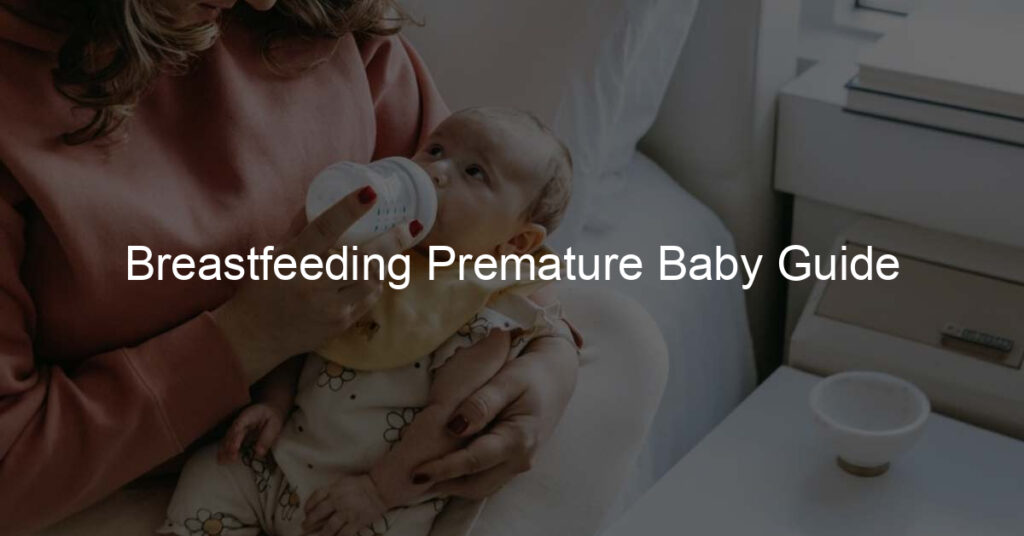If you are a mother of a premature baby, you may be wondering how to go about breastfeeding. This can be a daunting task, but it is important to remember that every mother and child is different. There is no one “right” way to do things. Find what works best for you and your baby and don’t be afraid to ask for help from your pediatrician or a lactation consultant.
This guide will provide some tips and information on breastfeeding your premature baby. Please keep in mind that this is not meant to be an all-inclusive guide, but rather a starting point for you on your journey of breastfeeding your premature baby.
When should I start breastfeeding my premature baby?
Breastfeeding a premature baby can be challenging, but starting as soon as possible is beneficial for nurturing growth and development. You can work with your newborn’s care team to find out when the best time to begin breastfeeding is based on the baby’s gestational age, condition, and feeding needs.
As soon as your baby is medically stable, it’s likely it will be ready to begin breastfeeding. A nurse or lactation consultant can provide support and guidance during the early stages of breastfeeding in order to ensure that you are both getting the most out of the process.
It is important to remember that every mother-infant pair is unique so progress may be slower than expected; however, both mom and baby will experience a multitude of benefits from early breastfeeding.
How often should I breastfeed my premature baby?
Premature babies are especially vulnerable and require extra attention and care in comparison to babies who are born full-term. As such, the amount of breastfeeding needed for a premature baby should be tailored based on the individual baby’s needs.
Generally speaking, healthcare practitioners suggest feeding your premature baby at least 8-12 times that span over a 24-hour period. It is important to remember that frequent feedings help increase both their caloric intake as well as proper digestive function.
Additionally, keep in mind that some feeding sessions might last longer or shorter depending on the strength and health of your little one. If you have any questions or concerns about how often you should breastfeed your premature baby, it is important to consult with your healthcare provider to get personalized advice and a plan in place.
What is the best way to breastfeed a preemie?
Breastfeeding a premature baby can be an intimidating task, but it is well worth the effort in terms of the health benefits that your child will receive.
The best way to ensure a successful experience is to have the most effective and comfortable positioning for both you and your baby. Skin-to-skin contact between mother and child is key for creating a relaxed environment, as this encourages several hormone reactions that promote healthy breastfeeding.
If you are having difficulty feeding your baby, speak with a lactation consultant who can offer advice on how to help make the process easier. Ultimately, with patience and persistence, you will be able to provide your preemie with nourishing breastmilk that will help them grow and develop.
How do I know if my preemie is getting enough breast milk?
As a parent of a preemie, one of the most important things you can do is set up a plan to make sure your baby is getting enough breast milk.
The number one indicator that your preemie is getting enough breast milk is to examine the diaper output. A thorough assessment of wet and dirty diapers should be done daily in order to ensure that your baby is receiving enough nutrients for growth and development.
In addition, babies should stably gain weight day after day over time. If you are finding it difficult to track changes in your preemie’s weight and output itself, talking with a lactation consultant or doctor may be beneficial as they can give you more personalized advice for your situation.
Fortunately, there are many resources available for parents of preemies, so if needed don’t hesitate to reach out for help!
How do you burp a premature baby?
Burping a premature baby can be harder than burping a baby who is full-term due to its smaller size and more delicate constitution.
The best method of burping is the football hold, where the baby is sitting on their caregiver’s arm and leaning against their chest for support. Make sure you support them with your free arm. To ensure that the stomach contents move up and out of the baby’s body, gently rock them over your shoulder while patting or rubbing their back – much like they may be used to in the womb.
Depending on the baby’s size, it can take quite some time to get a burp out, but keep at it and eventually, you should have success!
Conclusion About Breastfeeding Premature Baby Guide
In conclusion, the journey of breastfeeding a premature baby can be challenging but ultimately rewarding. A successful best-feeding experience requires important considerations and relevant knowledge to be taken into account.
Maintaining a balanced and nutritious diet while breastfeeding can be difficult, and guidance from health professionals should always be trusted. Keeping in mind that each case is different, having realistic expectations of what success looks like for your situation will ensure you’re adequately prepared for the ride ahead.
With every change comes both good and bad days, so it’s important to stay as positive and motivated as possible when caring for a premature baby. Ultimately, educated mothers make empowered mothers – keep learning and expanding your expertise to gain more confidence in taking care of your newborn.














